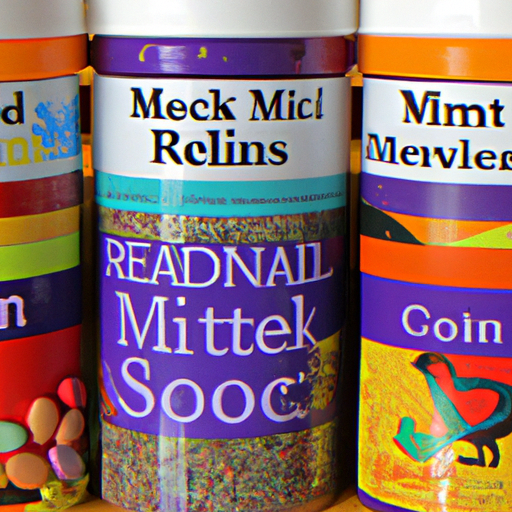Take a moment to consider the well-being of your beloved feathered friends, your chickens. Have you ever wondered if there are any essential vitamins or supplements that could contribute to their overall health? Ensuring the optimal condition of your chickens is not only important for their own happiness, but it can also have a positive impact on the quality of eggs they produce. In this article, we will explore the benefits of incorporating essential vitamins and supplements into their diet, helping you provide the best care possible for these clucking companions.
The Importance of Vitamins and Supplements for Chicken Health
As a chicken owner, you want to ensure the health and well-being of your feathered friends. Just like humans, chickens require essential vitamins and supplements to thrive. These nutrients play a crucial role in their overall health, growth, and disease prevention. In this comprehensive article, we will explore why vitamins and supplements are necessary for chickens, how they contribute to overall chicken health, recommended daily dosages, sources of these nutrients, the effects of deficiencies, factors to consider in choosing the right ones, integrating them into the chicken’s diet, and the importance of consulting with a veterinarian.
Why Vitamins and Supplements Are Necessary for Chickens
Vitamins and supplements are essential for maintaining the optimal health of chickens. These nutrients perform various functions in their bodies, including boosting the immune system, promoting healthy bone development, facilitating digestion, and enhancing egg production. While a balanced diet is important, it may not always provide all the necessary nutrients in the required amounts. That’s where vitamins and supplements come in – they fill in the nutritional gaps, ensuring that chickens receive the necessary vitamins, minerals, and other beneficial compounds for their overall well-being.
How Vitamins and Supplements Contribute to Overall Chicken Health
Vitamins and supplements contribute to overall chicken health in multiple ways. Firstly, they support the proper functioning of the immune system, which helps chickens fight off infectious diseases and maintain overall resistance to illness. Secondly, these nutrients play a vital role in promoting bone health and strength, preventing common skeletal issues such as fractures and deformities. Additionally, vitamins and supplements aid in the digestion and absorption of nutrients, ensuring that chickens can efficiently utilize the nutrients present in their feed. Furthermore, certain supplements can enhance the quality and production of eggs, making them more robust and nutritious. Overall, by including vitamins and supplements in your chicken’s diet, you are ensuring their optimal health and well-being.
Vitamins for Chicken Health
There are several essential vitamins that are crucial for chicken health. Let’s explore some of the most important ones:
Vitamin A
Vitamin A is essential for maintaining healthy skin, feathers, and eyesight in chickens. It also plays a vital role in the proper functioning of the reproductive system. A deficiency in vitamin A can lead to poor feather quality, decreased egg production, and even impaired vision.
Vitamin D
Vitamin D is responsible for the absorption of calcium and phosphorus, which are essential for strong bones and eggshell formation. Adequate exposure to sunlight allows chickens to naturally produce vitamin D. However, during periods of limited sunlight or confinement, supplementing with vitamin D becomes crucial to prevent deficiencies.
Vitamin E
Vitamin E is an antioxidant that helps protect chickens’ cells from damage caused by free radicals. It also promotes healthy immune function and plays a role in fertility and reproduction. Supplementing with vitamin E can improve disease resistance and overall reproductive performance in chickens.
Vitamin K
Vitamin K plays a critical role in the blood clotting process, preventing excessive bleeding. It also contributes to healthy bone development and mineralization. While chickens can produce some vitamin K in their intestines, supplementation ensures an adequate supply for optimal health.
Vitamin B Complex
The B vitamins are a group of essential vitamins that are vital for numerous bodily functions. They contribute to energy production, promote healthy feather growth, support the nervous system, and aid in proper digestion. The B complex vitamins include thiamine (B1), riboflavin (B2), niacin (B3), pantothenic acid (B5), pyridoxine (B6), biotin (B7), folate (B9), and cobalamin (B12).
Supplements for Chicken Health
In addition to vitamins, supplements can also play a crucial role in maintaining chicken health. Let’s explore some important supplements for chickens:
Calcium
Calcium is essential for strong bones, proper eggshell formation, and muscle function. Lack of calcium in a chicken’s diet can lead to weak bones, eggshell abnormalities, and even egg-binding. Providing calcium supplements, especially during periods of high egg production, can help prevent these issues.
Probiotics
Probiotics are beneficial bacteria that promote a healthy gut environment. They aid in digestion, improve nutrient absorption, and enhance the immune system. By incorporating probiotics into your chicken’s diet, you can help maintain a balanced gut flora and prevent digestive issues.
Omega-3 Fatty Acids
Omega-3 fatty acids are important for promoting heart health, reducing inflammation, and improving egg quality. Supplementing with omega-3 fatty acids, such as flaxseed or fish oil, can increase the omega-3 content in eggs, providing additional nutritional value for you and your family.
Herbs and Herbal Supplements
Certain herbs and herbal supplements have been used for centuries to promote chicken health. For example, garlic is believed to have antimicrobial properties, while oregano is known for its immune-boosting effects. Incorporating these herbs or using herbal supplements can provide additional health benefits for your chickens.
Recommended Daily Dosages for Chickens
Determining the appropriate daily dosages of vitamins and supplements for chickens can be a challenging task. It’s crucial to strike a balance between providing enough of these nutrients and avoiding overdosing. Individual chicken requirements may vary based on factors like age, breed, and specific health concerns. Consultation with a veterinarian is highly recommended to determine the optimal dosages for your flock.
Determining the Dosages for Different Vitamins and Supplements
When determining the dosages for vitamins and supplements, it’s important to consider the nutritional content of the chicken feed. Many commercial chicken feeds contain added vitamins and minerals, which can affect the amount of supplementation necessary. Research the specific nutritional needs of the vitamins and supplements you plan to use, and work with your veterinarian to calculate appropriate dosages based on your chicken’s specific circumstances.
Avoiding Overdosing on Vitamins and Supplements
While providing the necessary vitamins and supplements is essential, too much of a good thing can be harmful. Overdosing on certain vitamins, such as vitamin D or calcium, can lead to adverse health effects. Carefully follow the recommended dosages and guidelines provided by your veterinarian or the manufacturer of the supplements. Regularly monitor your chickens for any signs of overdose, such as decreased appetite, lethargy, or abnormal behavior.
Sources of Vitamins and Supplements
There are various sources from which you can provide vitamins and supplements to your chickens. Let’s explore the options:
Natural Sources of Vitamins and Supplements for Chickens
One way to provide vitamins and supplements to your chickens is through their natural diet. Certain foods, such as dark leafy greens, carrots, and liver, are rich in vitamins A, E, and K. Sunlight exposure enables chickens to naturally produce vitamin D. Offering a variety of nutritious foods and allowing access to sunlight are beneficial ways to incorporate vitamins into their diet.
Commercially Available Supplements for Chicken Health
Another option is to use commercially available supplements specifically formulated for chicken health. These supplements are conveniently packaged, ensuring precise dosages and high-quality ingredients. They are designed to meet the specific nutritional needs of chickens and are often the most reliable way to provide essential vitamins and supplements.
Effects of Vitamin and Supplement Deficiencies
Recognizing the symptoms of vitamin and supplement deficiencies is crucial for maintaining the health of your chickens. Here are some common signs to watch out for:
Recognizing Symptoms of Vitamin and Supplement Deficiencies
- Vitamin A deficiency: Poor feather quality, decreased egg production, night blindness, respiratory issues.
- Vitamin D deficiency: Weak bones, soft eggshells, poor growth, decreased egg production.
- Vitamin E deficiency: Muscle weakness, reproductive issues, decreased immune function.
- Vitamin K deficiency: Delayed blood clotting, excessive bleeding, poor bone development.
- B vitamin deficiencies: Poor feather growth, reduced appetite, nervous system disorders, impaired growth.
Long-Term Consequences of Deficiencies
Long-term deficiencies in essential vitamins and supplements can have severe consequences for chicken health. They can result in reduced egg production, poor growth, weakened immune systems, skeletal deformities, and even death. Promptly addressing and rectifying any deficiencies is essential to ensure the long-term health and well-being of your flock.
Factors to Consider in Choosing Vitamins and Supplements
Several factors should be considered when selecting the right vitamins and supplements for your chickens:
Chicken Breed and Age
Different chicken breeds have varying nutritional requirements. Larger breeds may require higher levels of certain vitamins and supplements to support their growth and development. Additionally, chickens at different life stages, such as chicks, pullets, or mature layers, may have specific nutritional needs that should be considered when selecting supplements.
Environmental Factors
Environmental factors, such as weather conditions and housing, can impact a chicken’s nutritional requirements. For example, during the winter months or in areas with limited sunlight, additional supplementation of vitamin D may be necessary. Similarly, chickens in stressful environments or exposed to high disease risks may benefit from supplements that boost their immune system.
Specific Health Concerns
If your chickens have specific health concerns, it’s important to choose vitamins and supplements that target those issues. For example, if you are dealing with a respiratory infection outbreak, supplements that support the immune system, such as vitamin C or echinacea, may be beneficial. Consulting with a veterinarian can help identify the appropriate supplements to address specific health concerns.
Integrating Vitamins and Supplements into Chicken Diet
Incorporating vitamins and supplements into your chicken’s diet can be done in different ways. Here are a few common methods:
Incorporating Vitamins and Supplements into Feed
One simple way to provide vitamins and supplements to your chickens is by mixing them directly into their feed. Most commercially available chicken feeds already contain added vitamins and minerals, but additional supplementation may still be necessary. Follow the recommended dosages provided by your veterinarian and mix the supplements thoroughly into their regular feed.
Alternative Methods of Administration
If your chickens are not consuming the supplements mixed in their feed, alternative administration methods can be used. One option is to provide the supplements as a separate treat or sprinkle them over their regular treats. Another method is to dissolve the supplements in their water, ensuring that they receive them through hydration. Consult with your veterinarian on the best alternative administration method for your flock.
Consulting with a Veterinarian
Considering the complexity of the nutritional needs of chickens, it is highly recommended to consult with a veterinarian specializing in poultry health. A professional veterinarian will be able to assess the specific needs of your flock, address any concerns or deficiencies, and provide expert advice on the appropriate vitamins and supplements.
The Importance of Professional Advice for Chicken Health
Veterinarians specializing in poultry health have the expertise and knowledge to ensure that your chickens receive the optimal care. They can perform health assessments, provide accurate dosage recommendations, and guide you in choosing the most suitable vitamins and supplements for your flock’s specific circumstances. Professional advice is invaluable in maintaining the long-term health and well-being of your chickens.
Working with a Veterinarian to Determine Optimal Vitamins and Supplements
When working with a veterinarian, they will conduct a thorough evaluation of your chickens’ health, taking into consideration factors such as breed, age, current diet, and any existing health concerns. Based on this assessment, they will provide personalized recommendations for the optimal vitamins and supplements to incorporate into your chicken’s diet. Regular check-ups and communication with your veterinarian will help ensure that your flock’s health remains a priority.
Conclusion
In conclusion, providing essential vitamins and supplements is crucial for the overall health and well-being of your chickens. These nutrients play a vital role in maintaining a robust immune system, promoting bone health, aiding digestion, and enhancing egg production. While a balanced diet is important, supplements are necessary to fill in the nutritional gaps. By understanding the importance of vitamins and supplements, determining the appropriate dosages, selecting reliable sources, addressing deficiencies, considering various factors, integrating them into the diet, and consulting with a veterinarian, you are ensuring optimal chicken health and a happy, thriving flock.




